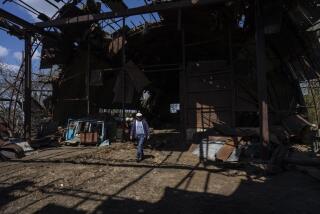AGRICULTURE : Famed Russian Seed Bank Now Is Withering : Institute that survived war and famine is threatened by the Soviet breakup and Moscow’s fiscal crisis.
- Share via
ST. PETERSBURG, Russia — Her neighbors, desperate for food, were eating rats. Others, crazed with hunger, were stripping flesh from human corpses. Her own body, subsisting on rations of five ounces of bread a day, was starving to death.
And yet, throughout the excruciating 900-day siege of Leningrad in World War II, Maria Bopkova never considered touching the three tons of rice, millet and plant seeds that she worked with each week in the Vavilov Institute of Plant Industry.
“The hunger was impossible--everyone was starving,” Bopkova, 91, said recently, twisting her gnarled hands incessantly as she recalled the war.
“People were dying, but we knew that it had been so difficult to gather and keep that collection that no one took anything, not even a seed,” she added, her blue eyes shocked at the suggestion that she might have been tempted to eat the collection. “No one even tried.”
Bopkova and her co-workers--some of whom died at their desks rather than break into the packets of food they were responsible for preserving--saved the Vavilov Institute’s world-renowned plant gene bank from the ravages of the Nazi blockade.
But now the collection is under siege again, this time threatened by Russia’s financial crisis and the dissolution of the Soviet Union. Branches in the newly independent nations of Georgia, Uzbekistan and Turkmenistan have severed ties with the institute’s headquarters in St. Petersburg, leaving scientists combing corners of Russia for climates suitable for warm-weather crops like grapes, cotton and citrus fruits.
To maintain the gene fund, researchers must periodically replant seeds and harvest fresh samples; if southern stations shut down, the institute may lose some collections altogether.
Further, budget cuts have forced the institute to cancel up to 90% of its expeditions this year, although the trips are vital for enriching the gene bank and its selective-breeding program, deputy director Alexander Konarev said.
“We worry that some types of seeds may be lost for all time, due to the destruction of nature, urbanization and human intervention,” Konarev said.
Founded in 1894, the Vavilov Institute holds about 360,000 different crop germ plasms--living tissue containing enough genetic information to reproduce the original plant or to select genes for breeding new strains of crops. Stored in metal boxes that look like a huge library card catalogue are 10,700 types of potatoes and other tubers, 7,600 strains of peas and 23,000 varieties of corn.
Walnut-sized green and jumbo red tomatoes ripen in the institute’s greenhouse next to troughs bursting with a dozen varieties of lettuce and flower pots sprouting decorative red, yellow, green and orange peppers.
Maintaining such diversity ensures that, if an epidemic hits a certain plant--such as the corn leaf blight that swept the United States in 1970, destroying 15% of the projected harvest --farmers will have access to more-resistant strains.
The oldest plant gene bank in the world, the institute--named for Russian biologist Nikolai Vavilov--has exchanged seeds with similar institutions around the globe for almost a century.
Recognizing that a plant gene fund was vital to preserve agriculture, Communist Party officials refused to touch the seeds, even as the dead piled up during the German blockade of Leningrad from 1941 to 1943.
Ironically, while the Soviet government supported the Vavilov Institute throughout the war, the Communist system guaranteed that the gene fund’s most important work would not be put to use. Over the years, the institute’s scientists have bred disease- and weather-resistant strains of key crops, including wheat, corn, cotton and rye. But the Soviet Union’s massive state-run collective farms passed up the chance to buy these more productive seeds.
Russia’s new leaders have introduced legislation that will allow farmers to work their own land, giving them perhaps their first incentive to increase productivity. But just when their country’s faltering agricultural system needs their help the most, institute scientists say budget cuts may force them to suspend their research.
Natalya Shulyakovskaya contributed to this report.
More to Read
Sign up for Essential California
The most important California stories and recommendations in your inbox every morning.
You may occasionally receive promotional content from the Los Angeles Times.













